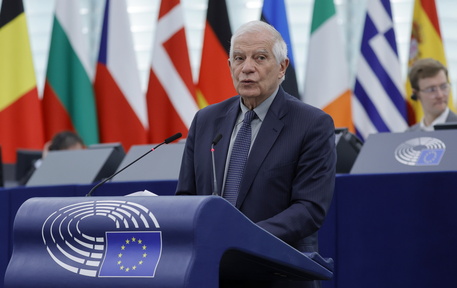(ANSA) - ROME, APR 24 - On Monday, EU foreign and defence
affairs ministers met in Luxembourg to discuss assistance for
Ukraine and further sanctions on Iran in light of both its
recent strike on Israel and its support of Russia's war against
Ukraine.
Drones and missiles.
EU foreign and defence ministers discussed support for Ukraine -
following US lawmakers' approval of a nearly 61 billion-dollar
aid package - as well as sanctions against Iran for its attack
on Israel and its arming of Russia.
The ministers instructed EU High Representative For Foreign
Affairs and Security Josep Borrell to submit concrete proposals
for sanctions. These should make it possible to impose further
trade restrictions on Iran in order to make it more difficult
for the country to build and develop drones and missiles. There
are also plans to impose sanctions on individuals, organisations
and companies.
"We have reached a political agreement in order to enlarge and
expand the existing drones [sanctions] regime to cover missiles
and their potential transfer to Russia," reported Borrell.
He added that the sanctions will include production and will
expand to shipments of drones and missiles not only to Russia,
but also to the entire Middle East and the Red Sea region. The
ministers also agreed to expand the list of drone components
that member states are prohibited from exporting to Iran.
An initial political agreement in principle for new Iran
sanctions had already been reached last week following the
recent escalation of the conflict between Israel and Iran. The
heads of state and government at the EU Council summit had
subsequently declared that "the European Union will take further
restrictive measures against Iran, in particular with regard to
drones and missiles". Iran has supplied Russia with drones.
On the margins of the summit, Slovenian Prime Minister Robert
Golob stressed that "the only way to reach peace is for all of
us to start to realise our responsibility together. This is the
position we will continue to defend, not only in the Middle
East, but also with regard to Ukraine and Russia".
On April 23, the Iranian Foreign Minister Hossein
Amir-Abdollahian condemned planned sanctions against his country
for the large-scale attack on Israel as "unlawful" and
"regrettable". Iran had exercised its right to self-defence with
the attack, Amir-Abdollahian wrote on X. He called for sanctions
against Israel instead.
Heightened tensions - what happened?.
The region has been plunged into turmoil since October 7, when
Hamas militants launched an attack that led to the deaths of
1,170 people in southern Israel, mostly civilians, according to
an AFP tally based on Israeli official figures.
Israel's retaliatory offensive has killed at least 34,012 people
in Gaza, mostly women and children, the territory's health
ministry said on April 19.
World leaders, politicians, NGOs and civilians have been calling
for a ceasefire for months.
Lebanon's powerful Iran-backed Hezbollah movement has engaged in
near-daily exchanges of fire with Israel since the war started.
There has also been a surge in violence involving Tehran-aligned
groups in Iraq, Yemen and Syria.
At the end of December, South Africa took Israel to the
International Court of Justice, accusing it of violating the
Genocide Convention during the ongoing Gaza war. In an interim
ruling, the UN court ordered Israel to take protective measures
to prevent genocide.
The spectre of a regional war has only been accentuated in the
past week following Iran's first-ever direct attack on Israel on
April 13-14 in retaliation for a deadly air strike on Tehran's
consulate building in Syria's capital Damascus on April 1, that
was widely blamed on Israel. Two generals and five other members
of Iran's Islamic Revolutionary Guard Corps (IRGC), the Islamic
Republic's ideological army, were among those killed.
Israel has said Iran launched "over 350 threats, ballistic
missiles, cruise missiles, rockets and suicide drones". Nearly
all the missiles and drones were intercepted by Israel and
others, including the United States, Britain and France.
Amidst these heightened tensions, some countries have set up
processes to extract their countries' citizens from Israel and
the broader Middle East region if necessary, for example North
Macedonia.
Early on April 19, explosions were reported in central Iran,
with senior US officials quoted in the press as saying that
Israel was retaliating.
Israel's ambassador to the United Nations on April 14, Gilad
Erdan, urged the Security Council to designate the Revolutionary
Guards as a "terrorist" organisation and to "impose all possible
sanctions on Iran before it's too late". Iran's envoy to the UN
said Tehran had "no choice" but to respond to the April 1
attack.
(continues)
(The content is based on news by agencies participating in the
enr, in this case AFP, ANSA, dpa, EFE, MIA, STA, TT). (ANSA).
Key Story: EU pushing for new sanctions against Iran
Tehran in spotlight over strike on Israel, support for Russia
